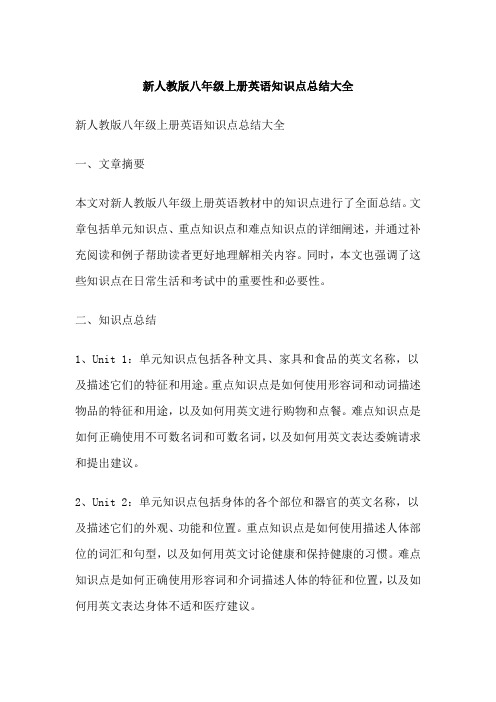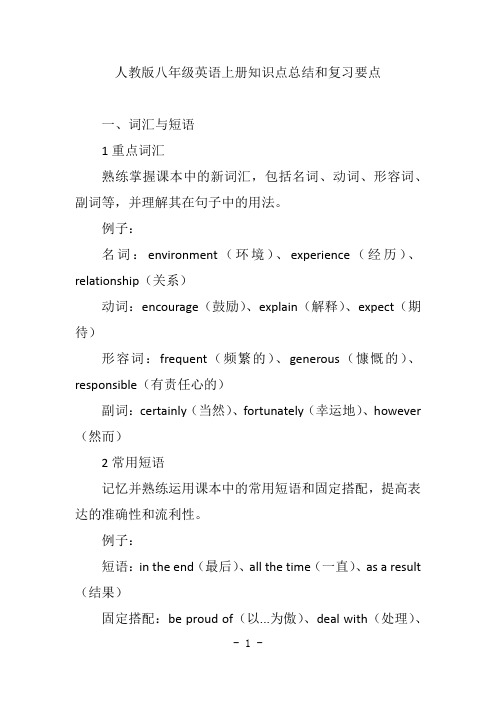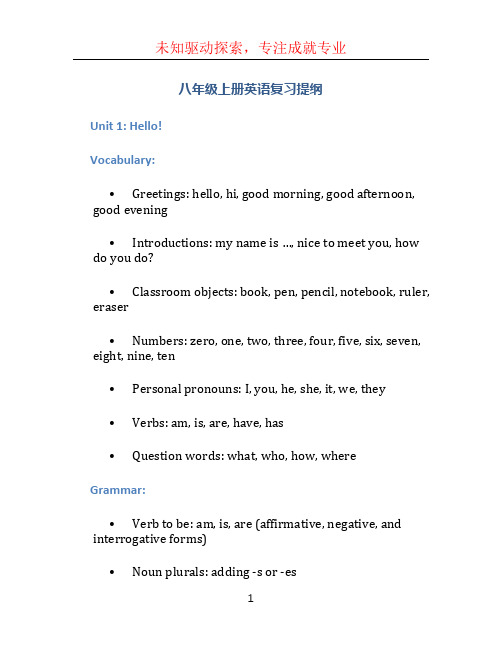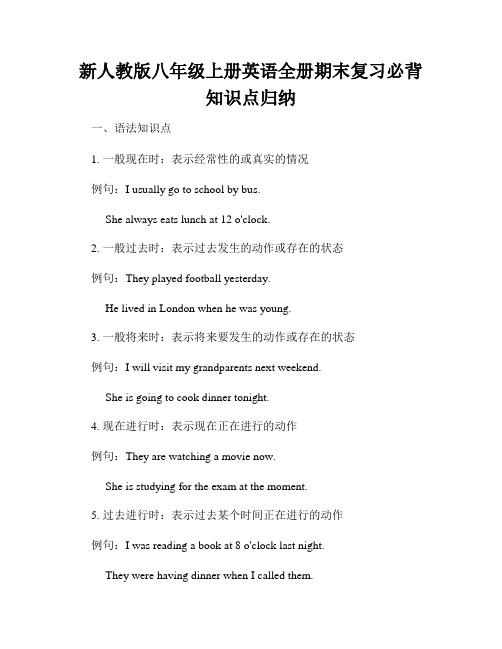新人教版八年级上册英语期末复习提纲
人教版八年级上册英语提纲总结

人教版八年级上册英语提纲总结学问化的过程是一个被概念化的过程,从一个活生生的人变成一个机器的过程。
下面给大家共享一些关于人教版八年级上册英语提纲造句,盼望对大家有所协助。
人教版八年级上册英语提纲1A.短语与固定搭配help with housework协助做家务on weekends在周末how often多久一次hardly ever几乎从不once a week每周一次twice a month每月两次every day每天be free有空go to the movies去看电影use the Internet用互联网swing dance摇摆舞play tennis打网球stay up late熬夜;睡得很晚at least至少have dance and piano lessons上舞蹈课和钢琴课go to bed early早点睡觉play sports进展体育活动how come? 怎么会be good for对……有好处sb. spend time with sb.和某人一起度过时间be bad for对……有害处sb. spend time / money on sth.在某方面花费时间/金钱be good with与……友好相处sb. spend time /money in doing sth.在做某事上花费时间/金钱be good at sth./ doing sth 擅长某事/做某事be friendly with sb. 与某人友好相处be friendly to sb. 对某人友好be kind to sb. 对某人友好go camping去野营not…at all一点儿也不……in one’s free time在某人的业余时间the most popular最受欢送的such as比方;诸如old habits die hard积习难改go to the dentist去看牙医morn than多于;超过less than少于help sb. with sth.协助某人做某事How about…? ......怎么样?/ ……好不好?want sb. to do sth.想让某人做某事How many+可数名词复数+一般疑问句? ……有多少……?主语+find+that从句. ……发觉……It’s+ adj.+ to do sth. 做某事的……的。
新人教版八年级上册英语知识点总结

新人教版八年级上册英语知识点总结
本文档总结了新人教版八年级上册英语的重要知识点。
一、基础语法知识
1. 时态和语态:包括一般现在时、一般过去时、一般将来时等常用时态,以及被动语态的构成和用法。
2. 名词:介绍了可数名词和不可数名词的区别,以及名词所有格的构成。
3. 代词:包括主格代词、宾格代词、形容词性物主代词和名词性物主代词的用法。
4. 形容词和副词:介绍了形容词和副词的比较级和最高级的构成规则,以及修饰方式的区别。
5. 介词:包括常用介词的用法和搭配,如in, on, at等。
6. 句子结构:主谓结构、主谓宾结构、并列句和复合句的构成和用法。
二、词汇与阅读技巧
1. 新词汇:列举了本册教材中出现的重要词汇,并给出了中文翻译和例句。
2. 阅读技巧:提供了阅读理解的技巧和方法,如快速阅读、略读和细读等。
三、听力技巧和口语表达
1. 听力技巧:介绍了有效提高听力理解能力的方法,包括听前预测、留意关键词等。
2. 口语表达:列举了常用口语表达,如问路、购物和介绍自己等。
四、写作技巧和语法点
1. 写作技巧:讲解了句子的结构和连接词的使用,以及一些常用写作句型和表达方式。
2. 语法点:解析了本册教材中出现的语法规则和用法,包括动词的时态和语态、名词的所有格等。
该文档总结了新人教版八年级上册英语的重要知识点,希望能对学生们的研究有所帮助。
(800字)。
八年级上英语期末考试知识点

八年级上英语期末考试知识点本文主要介绍八年级上英语期末考试的知识点,包括词汇、语法、阅读和听力等方面,共分为四个部分。
一、词汇1. 名词常见的名词有人名、地名、国家名称、学科名称等等。
在考试中,可以通过选择题或填空题来测试对名词的掌握。
2. 动词掌握动词的时态和语态是英语学习的一个重要环节。
必须熟练掌握各种时态的用法,如一般现在时、一般过去时、现在进行时、过去进行时等等。
3. 形容词和副词形容词和副词是描述人、事物或感受的词语,要正确运用表示程度或比较级的形容词和副词。
二、语法1. 时态和语态掌握各种时态和语态的用法是英语学习的关键。
要注意在不同情况下选择不同的时态和语态。
2. 介词和冠词介词是修饰名词或代词的重要词汇。
在日常生活中,介词用法很多,要注意掌握各种情况下的使用规则。
冠词则是修饰名词的一种词语,包括定冠词和不定冠词。
3. 主谓一致在考试中,通常会考察主谓一致问题。
考生需要理解主语和谓语之间的关系,正确选择单数或复数形式。
三、阅读阅读理解是英语学习的核心部分之一,主要考察考生对短文和文章的理解能力。
考题形式包括选择、填空和简答等题型,要求考生仔细研读题目,理解文章的含义和主旨。
四、听力听力是英语能力的重要组成部分,也是考试中常见的一种题型。
考生需要通过听力材料听懂其含义,正确回答听力题目。
结语以上是八年级上英语期末考试的主要知识点,希望大家复习的时候能够认真对待,加强对英语基础知识的掌握和运用,达到更好的考试成绩。
新人教版八年级上册英语知识点总结大全

新人教版八年级上册英语知识点总结大全新人教版八年级上册英语知识点总结大全一、文章摘要本文对新人教版八年级上册英语教材中的知识点进行了全面总结。
文章包括单元知识点、重点知识点和难点知识点的详细阐述,并通过补充阅读和例子帮助读者更好地理解相关内容。
同时,本文也强调了这些知识点在日常生活和考试中的重要性和必要性。
二、知识点总结1、Unit 1:单元知识点包括各种文具、家具和食品的英文名称,以及描述它们的特征和用途。
重点知识点是如何使用形容词和动词描述物品的特征和用途,以及如何用英文进行购物和点餐。
难点知识点是如何正确使用不可数名词和可数名词,以及如何用英文表达委婉请求和提出建议。
2、Unit 2:单元知识点包括身体的各个部位和器官的英文名称,以及描述它们的外观、功能和位置。
重点知识点是如何使用描述人体部位的词汇和句型,以及如何用英文讨论健康和保持健康的习惯。
难点知识点是如何正确使用形容词和介词描述人体的特征和位置,以及如何用英文表达身体不适和医疗建议。
3、Unit 3:单元知识点包括时间和日期的英文表达方式,以及描述日常活动和计划的句型和词汇。
重点知识点是如何用英文表达时间和日期,以及如何用情态动词和动词短语表达日常活动和计划。
难点知识点是如何正确使用序数词和基数词表达日期,以及如何用英文表达将来的时间和计划。
4、Unit 4:单元知识点包括家庭成员、职业和地点的英文名称,以及描述它们的特征和功能。
重点知识点是如何使用描述人物和地点的词汇和句型,以及如何用英文讨论家庭、职业和地点。
难点知识点是如何正确使用名词和代词描述人物和地点,以及如何用英文表达个人喜好和观点。
5、Unit 5:单元知识点包括天气、服装和季节的英文表达方式,以及描述人们的活动和喜好。
重点知识点是如何用英文表达天气、服装和季节,以及如何用动词短语和从句描述人们的活动和喜好。
难点知识点是如何正确使用名词和形容词描述天气、服装和季节,以及如何用英文表达个人喜好和偏好的原因。
人教版八年级英语上册知识点总结和复习要点

人教版八年级英语上册知识点总结和复习要点一、词汇与短语1重点词汇熟练掌握课本中的新词汇,包括名词、动词、形容词、副词等,并理解其在句子中的用法。
例子:名词:environment(环境)、experience(经历)、relationship(关系)动词:encourage(鼓励)、explain(解释)、expect(期待)形容词:frequent(频繁的)、generous(慷慨的)、responsible(有责任心的)副词:certainly(当然)、fortunately(幸运地)、however (然而)2常用短语记忆并熟练运用课本中的常用短语和固定搭配,提高表达的准确性和流利性。
例子:短语:in the end(最后)、all the time(一直)、as a result (结果)固定搭配:be proud of(以...为傲)、deal with(处理)、pay attention to(注意)二、句型与语法1基本句型熟练掌握五种基本句型,包括主语+谓语、主语+谓语+宾语、主语+谓语+间接宾语+直接宾语、主语+谓语+宾语+宾语补足语、主语+系动词+表语。
例子:主语+谓语:She sings.(她唱歌。
)主语+谓语+宾语:I like apples.(我喜欢苹果。
)主语+谓语+间接宾语+直接宾语:He gave me a book.(他给了我一本书。
)主语+谓语+宾语+宾语补足语:I found the book interesting.(我发现这本书很有趣。
)主语+系动词+表语:She is beautiful.(她很漂亮。
)2时态深入学习并掌握现在完成时、过去进行时、一般将来时、过去将来时等时态的用法和形式。
例子:现在完成时:I have already seen that movie.(我已经看过那部电影了。
)过去进行时:They were playing football when I called them.(我打电话给他们时,他们正在踢足球。
八年级上册英语复习提纲

八年级上册英语复习提纲Unit 1: Hello!Vocabulary:•Greetings: hello, hi, good morning, good afternoon, good evening•Introductions: my name is …, nice to meet you, how do you do?•Classroom objects: book, pen, pencil, notebook, ruler, eraser•Numbers: zero, one, two, three, four, five, six, seven, eight, nine, ten•Personal pronouns: I, you, he, she, it, we, they•Verbs: am, is, are, have, has•Question words: what, who, how, where Grammar:•Verb to be: am, is, are (affirmative, negative, and interrogative forms)•Noun plurals: adding -s or -es•Possessive adjectives: my, your, his, her, its, our, their•Present simple tense: affirmative, negative, and interrogative forms•Demonstrative pronouns: this, that, these, those•Wh-questions: what, who, how, where (asking for information)Skills:•Greeting and introducing oneself to others•Describing classroom objects•Expressing possession•Asking and answering questions about people and objects•Giving personal information•Describing daily routinesUnit 2: School LifeVocabulary:•Classroom subjects: English, math, science, history, geography•School facilities: library, laboratory, computer room, playground•School supplies: pencil case, backpack, textbook, notebook•Adjectives to describe school: big, small, old, new, interesting, boring•Daily routines: get up, have breakfast, go to school, have lunch, go home, do homeworkGrammar:•Present simple tense: negative and interrogative forms•Adjectives for describing objects•Adverbs of frequency: always, usually, often, sometimes, rarely, never•Demonstrative pronouns: this, that, these, those (review)•Prepositions of time: in, on, at (for daily routines)•Imperatives: get up, have breakfast, go to school, etc. (giving orders or instructions)Skills:•Talking about school subjects and facilities•Describing school supplies and personal routines•Giving instructions or orders•Talking about frequency of activities•Understanding prepositions of timeUnit 3: Family and FriendsVocabulary:•Family members: mother, father, sister, brother, grandparents, aunt, uncle•Personal characteristics: kind, friendly, funny, smart, talented•Possessions: toys, clothes, shoes, books, bags•Adjectives to describe people: tall, short, thin, fat•Verbs for family activities: eat, drink, play, watch, sing, dance, readGrammar:•Possessive pronouns: mine, yours, his, hers, ours, theirs•Present simple tense: affirmative, negative, and interrogative forms (review)•Adjectives for describing people•Action verbs for activities•Wh-questions: who, what (review)Skills:•Talking about family members and personal characteristics•Describing possessions and appearance•Talking about activities with family and friends•Asking and answering questions about people and objectsUnit 4: Hobbies and InterestsVocabulary:•Hobbies: swimming, cycling, painting, playing soccer, reading, singing, dancing•Musical instruments: guitar, piano, violin, drums•Sports: basketball, baseball, tennis, volleyball, table tennis•Leisure activities: watching movies, playing computer games, shopping, traveling•Adjectives to describe hobbies and interests: fun, interesting, relaxing, excitingGrammar:•Present continuous tense: affirmative, negative, and interrogative forms•Adverbs of manner: carefully, well, quickly, slowly•Comparatives and superlatives: long, longer, longest; good, better, best•Prepositions of place: in, on, at (talking about locations)•Wh-questions: what, who, where, when (review) Skills:•Talking about hobbies and interests•Describing leisure activities•Talking about ongoing actions•Comparing things with superlative and comparative forms•Asking and answering questions about hobbies and interestsUnit 5: My CityVocabulary:•Buildings: school, hospital, library, supermarket, park, restaurant, bank•Places in the city: street, square, bus stop, train station, airport•Directions: turn left, turn right, go straight ahead•Modes of transportation: bus, subway, taxi, bike, car •Adjectives to describe cities: big, small, crowded, peaceful, modern, historicGrammar:•Present continuous tense: negative and interrogative forms (review)•Prepositions of place: in, on, at (review)•Simple future tense: will (affirmative, negative, and interrogative forms)•Imperatives for giving directions: turn left, go straight ahead, etc. (review)•Wh-questions: where, how (for asking about locations and directions)Skills:•Talking about buildings and places in the city•Describing cities and transportation modes•Giving and following directions in a city•Talking about future plans or activities in a city•Asking and answering questions about locations and directions。
(人教版新目标)八年级英语上册全册各单元知识点期末总复习讲解教学课件

3. feel like “感受到;摸起来”,后跟宾语 从句或名词。 I felt like I was a bird. 我感觉我是一只鸟。 It feels like a stone. 它摸起来像一块石头。
eg.something special; somewhere wonderful. 2.不定代词做主语时,谓语动词用第三人称单数。 eg.Is everybody here? 大家都到齐了吗?
1. get to/reach/arrive 都是“到达“的意思。
get to+sp=reach+sp = arrive at+sp(小)=arrive in+sp(大) 若他们后面要加地点副词here, there, home等,则 不需要加介词。
25、up and down上上下下 26、come up出来 27、enjoy oneself=have fun=have a good time
玩的开心
二、重要句子(语法):
1.Where did you go on vacation? 你到哪里去度假了?
I went to New York City. 我去了纽约城。
三、习惯用法、搭配
1. buy sth. for ab./ buy sb. sth. 为某人买某物 2. taste + adj. 尝起来…… 3. nothing to do but do除了……之外无事可干 4. seem + (to be) + adj 看起来 5. arrive in + 大地方 / arrive at + 小地方 到达某地 6. decide to do sth=make a decision决定做某事 7. try doing sth. 尝试做某事
新人教版八年级上册英语全册期末复习必背知识点归纳

新人教版八年级上册英语全册期末复习必背知识点归纳一、语法知识点1. 一般现在时:表示经常性的或真实的情况例句:I usually go to school by bus.She always eats lunch at 12 o'clock.2. 一般过去时:表示过去发生的动作或存在的状态例句:They played football yesterday.He lived in London when he was young.3. 一般将来时:表示将来要发生的动作或存在的状态例句:I will visit my grandparents next weekend.She is going to cook dinner tonight.4. 现在进行时:表示现在正在进行的动作例句:They are watching a movie now.She is studying for the exam at the moment.5. 过去进行时:表示过去某个时间正在进行的动作例句:I was reading a book at 8 o'clock last night.They were having dinner when I called them.6. 情态动词 can 和 could:表示能力或许可例句:I can swim very well.He could speak three languages when he was young. 7. 情态动词 must 和 have to:表示义务、必须或强制性例句:You must finish your homework before going out.I have to wake up early tomorrow.8. 情态动词 should:表示建议或应该例句:You should eat more vegetables for better health. She should go to bed early for enough sleep.9. 动词不定式:表示目的、原因、结果或时态等例句:I went to the supermarket to buy some fruits.She is happy to hear the good news.二、词汇知识点1. 人称代词:用于代替特定人或物例句:He is my brother.They are good friends.2. 数词:表示数量的词语例句:There are ten students in the classroom.I have two cats and three dogs.3. 形容词:修饰名词或代词,描述人或物的特征例句:She is a beautiful girl.This is a big house.4. 副词:修饰动词、形容词、副词等,表示时间、地点、程度等例句:She runs fast.He speaks English fluently.5. 介词:介绍名词与其他词语之间的关系例句:I have a pen in my bag.The book is on the table.6. 连词:连接句子、词组或单词例句:I like swimming and playing basketball.She can play the guitar or the piano.7. 冠词:用于限定名词例句:I have an apple.The book on the table is mine.三、题型解析1. 完形填空题:根据上下文意思,选出合适的单词填空Tom: What's your favorite ________?Emily: I like watching ________.Tom: Me too. Let's go to the ________ tonight.A. colorB. movieC. sportD. book答案:B2. 阅读理解题:阅读短文,回答相关问题例题:My name is Lucy. I am twelve years old. I ________ to school every day. My favorite ________ is English. I like playing basketball ________ school. My dream is to become a ________ in the future.What does Lucy like playing?A. basketballB. soccerC. tennisD. volleyball答案:A3. 选择填空题:选择合适的单词或短语填空例题:Lucy: What's your ________ food, Tom?Tom: I like ________ because it tastes delicious.A. favoriteB. leastC. difficultD. easy4. 任务型阅读题:根据文章内容,完成相应的任务例题:请你根据短文内容,回答以下问题:What is the main idea of the passage?答案:The passage is about Lucy's daily life and her dream.四、写作技巧1. 写作时要注意使用适当的句式和词汇,使文章更加丰富多样。
- 1、下载文档前请自行甄别文档内容的完整性,平台不提供额外的编辑、内容补充、找答案等附加服务。
- 2、"仅部分预览"的文档,不可在线预览部分如存在完整性等问题,可反馈申请退款(可完整预览的文档不适用该条件!)。
- 3、如文档侵犯您的权益,请联系客服反馈,我们会尽快为您处理(人工客服工作时间:9:00-18:30)。
初中英语八年级上册复习要点Unit 1 Where did you go on vacation? 重点短语:(1)go on vacation 去度假(2)stay at home 呆在家(3)go to the mountains 去爬山(4)go to the beach去沙滩(5)visit museums 参观博物馆(6)go to summer camp 夏令营(7)quite a few 相当多,不少(8)study for……为…而学习(9)go out 出去(10)most of the time大多数时间(11)taste good 尝起来不错(12)have a good time过得愉快(13)feel like 感受到(14)go shopping 去买东西(15)in the past 在过去(16)walk around…..四处走走(17)too many 太多(18)because of+短语因为(19)one bowl of 一碗。
(20)find out 查明,弄清(21)take photos 照相(22)something important 重要的事情(23)up and down 上上下下(24)come up 上来,出现(25)of course 当然(26)come down 下来重点语法:(1)Where did you go on vacation? I went to New York City.(2)Did you go out with anyone? No, No one was here. Everyone was on vacation. (3)Did you buy anything special? Yes, I bought something for my father.(4)How was the food? Everything tasted really good.(5)Did everyone have a good time? Oh,yes. Everything was excellent.习惯用法:(1)buy sth for sb./ buy sb. sth 为某人买某物(2)taste + adj. 尝起来……(3)nothing ...but + V.(原) 除了…之外什么都没有(4)seem + (to be) + adj 看起来(5). arrive in + 大地方arrive at + 小地方到达某地(6)decide to do sth. 决定做某事(7). try doing sth. 尝试做某事(8)try to do sth. 尽力做某事(9)try one`s best to do sth尽力做某事(10)enjoy doing sth. 喜欢做某事(11)want to do sth.想去做某事(12)start doing sth. 开始做某事(13)stop doing sth. 停止做某事stop to do sth 停下来做某事(14)look + adj 看起来(15)dislike doing sth. 不喜欢做某事(16)Why not do sth. 为什么不做…….呢?(17)so + adj + that + 从句如此…以至于(18)tell sb. (not) to do sth. 告诉某人(不要)做某事(19)keep doing sth. 继续做某事(20).forget to do sth. 忘记去做某事(未做)forget doing sth忘记做过某事(已做)词语辨析:1.anywhere 与somewhere 两者都是不定副词。
anywhere 在任何地方,常用于否定句和疑问句中。
I can’t find it anywhere.somewhere 在某处,到某处,常用于肯定句。
I lost my key somewhere near here.2. seem + adj 看起来…..You seem happy today. seem + to do sth. 似乎、好像做某事I seems / seemed + that来好像…;似乎….seem like ….好像,似乎3. decide to do sth.决定做某事They decide to visit the museum.decide + 疑问词+ 动词不定式He can not decide when to leave.4. start doing sth = start to do sth. 开始,可与begin 互换。
例:He started doing his homework.5.over 介词,多于,超过,在…以上(表示数目、程度)= more than例:My father is over 40 years old.6.too many 太多,后接可数名词复数:例:Mother bought too many eggs yesterday. too much 太多,修饰不可数名词,修饰动词。
例:We have too much work to do.例:Don’t talk too much.7. because of 因为,由于,后接名词、代词或动名词,不能接句子。
例:He can’t take a walk because of the rain. because 连词,因为,引导状语从句,表示直接明确的原因。
8. too,…to太….以至于不能….例:Mother is too tired to go to school.9. have fun doing sth享受做某事的乐趣Unit 2How often do you exercise? 短语:(1)help sb with sth 帮助某人做某事(2)go shopping去买东西(3)on weekends 在周末(4)how often 多少次(5)hardly ever几乎从不(6)once a week 一星期一次(7)twice a month一个月两次(8)go to the movies 去看电影(9)every day 每天(10)use the Internet上网(11)be free=be not busy=have time 有空12)have dance and pianolessons上舞蹈和钢琴课(13)swing dance 摇摆舞(14)play tennis 打网球(15)stay up late熬夜到很晚(16)go to sleep 睡觉(17)go to bed上床睡觉(18)at least 至少,不少于(19)go to bed early 上床睡觉早(20)play sports 做运动(21)be good for 对….有好处(22)be good at doing sth擅长做某事(23)go camping去野营(24)in one’s free time 在某人的业余时间(25)the most popular 最受欢迎(26)such as 例如….像….这样(27)go to the dentist看牙科医生(28)more than 多于(29)old habits die hard 旧习难改(30)less than 少于(31)junk food垃圾食品(32)take care of sb 照料某人(33)look after sb照顾某人(34)have to do sth必须做某事(35)get in…进入…(36)be late for 迟到语法要点:(1)What do you usually do on weekends? I always exercise.(2)What do they do on weekends? They often help my mother with housework. (3)What does she do on weekends? She sometimes goes shopping.(4)How often do you go to the movies? I go to the movies maybe once a month. (5)How often does he watch TV? He hardly ever watches TV.(6)Do you go shopping? No, I never go shopping.习惯用法:1. help sb. with sth=have sb do sth帮某人做某事2. How about doing…? ….怎么样?/ ….好不好?3. want sb. to do sth. 想让某人做某事4. How many + 可数名词复数+ 一般疑问句5. 主语+ find+ that 从句发现…6. It’s + adj.+ to do sth. 做某事是….的7. spend time with sb. 和某人一起度过时光8. ask sb. about sth. 向某人询问某事9. by doing sth. 通过做某事10. What’s your favorite…?你最喜欢的…是什么?11 start doing sth. 开始做某事12. the best way to do sth. 做某事的最好方式13.full of满的14.what about doing sth?做某事怎么样?15.not….at all 一点儿也不I don`t like it at all. 我一点儿也不喜欢它。
词语辨析:1. free 空闲的,有空的,反义词为busy.be free 有空,闲着,相当于have time.I’ll be free next week. = I’ll have time next week.2. How come?怎么会?怎么回事?表示某件事情很奇怪,有点想不通;可单独使用,也可引导一个问句,相当于疑问句why,但how come 开头的特殊疑问句使用的仍然是陈述语序。
例:How come Tom didn’t come to the party? = Why didn’t Tom come to the party?3. stay up late 指“熬夜到很晚,迟睡”。
stay up 指“熬夜,不睡觉”。
4. go to bed 强调“上床睡觉”的动作及过程,但人不一定睡着。
